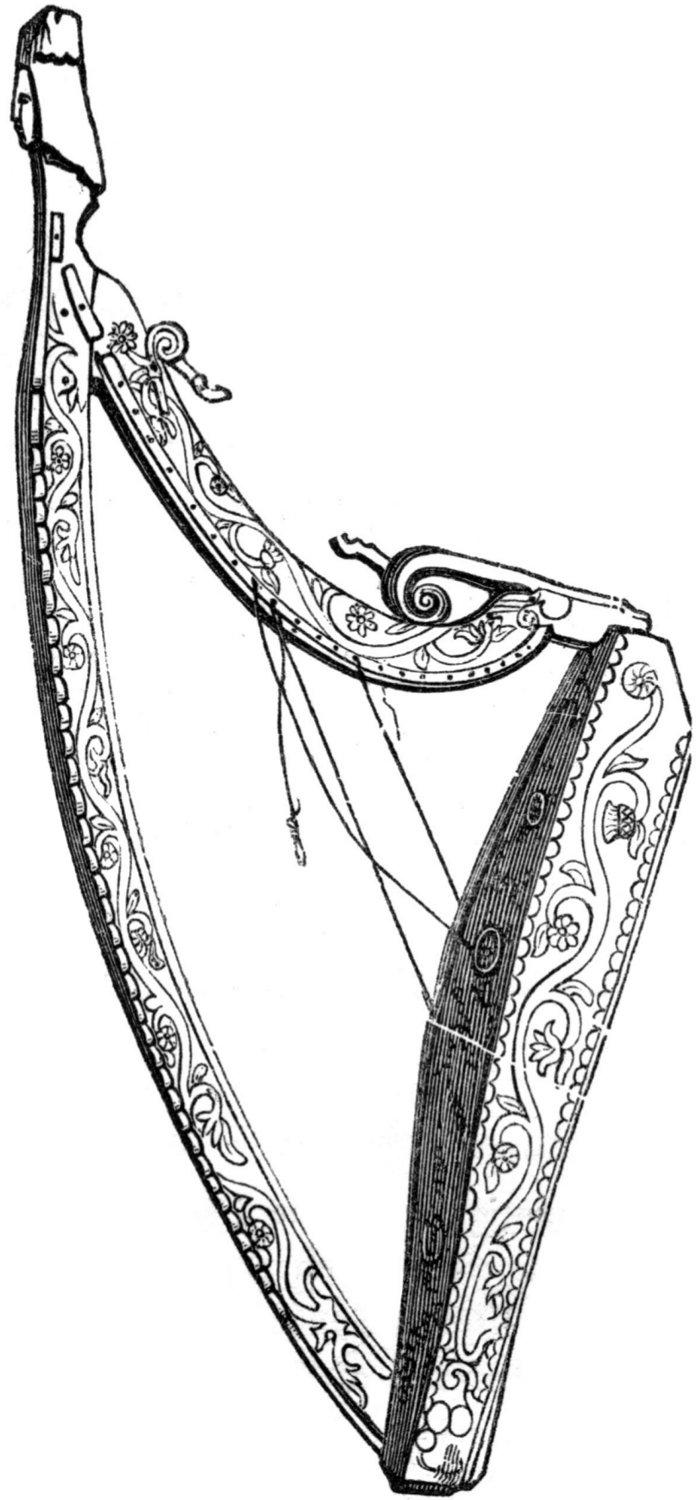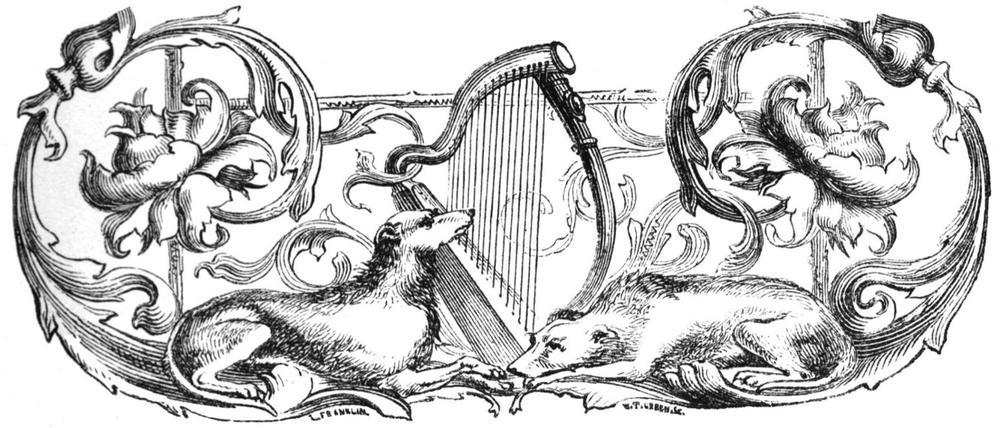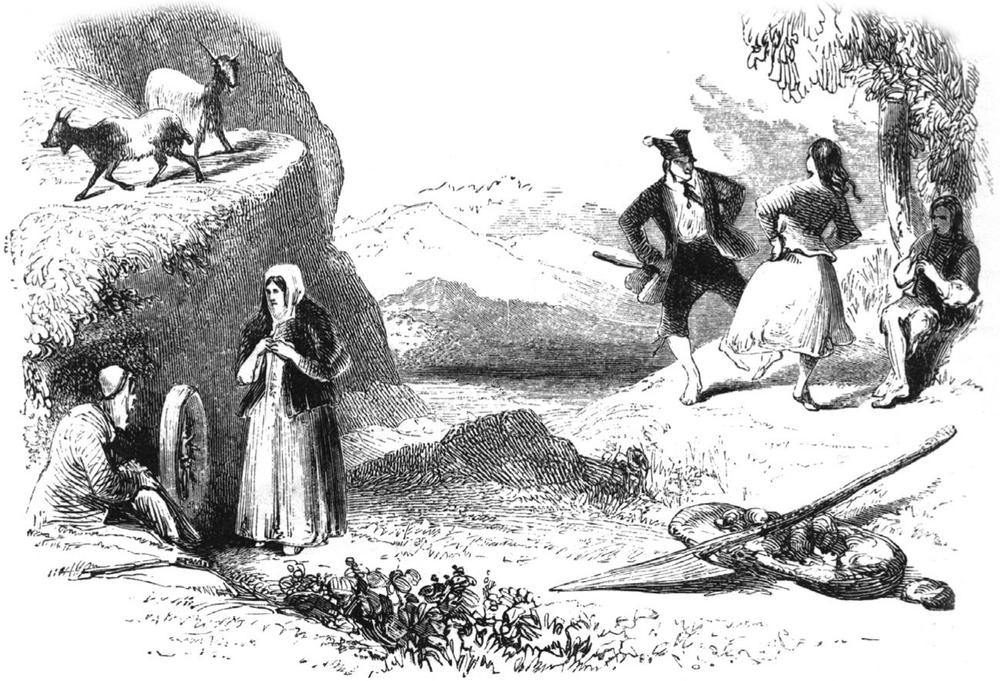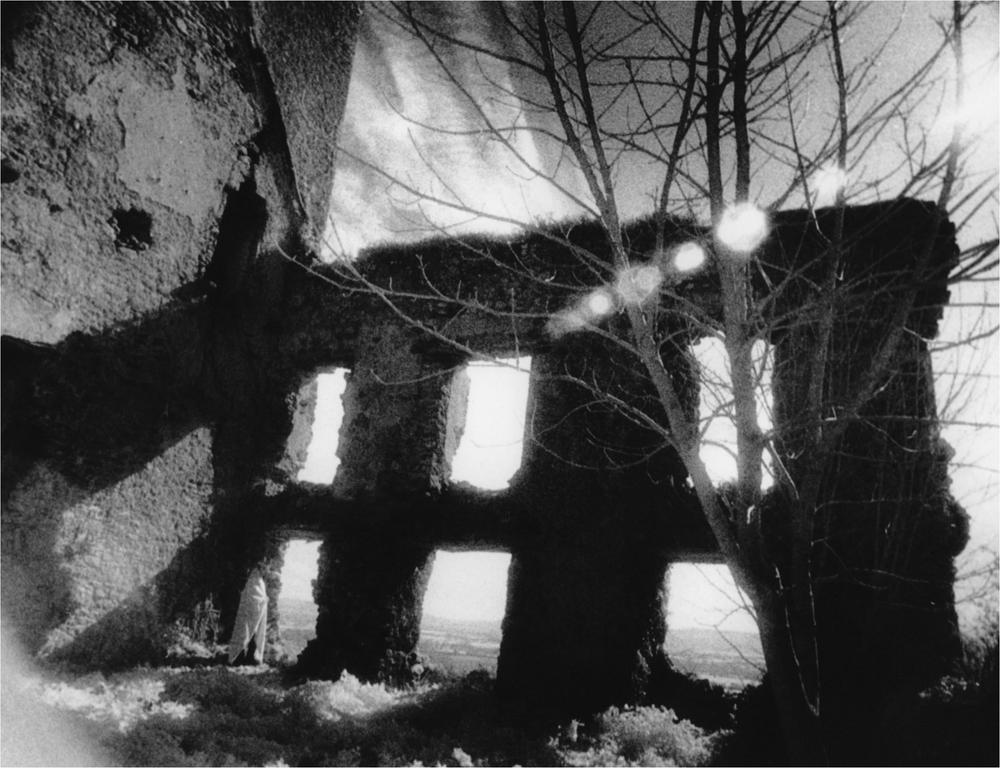Slievenamon (Sliabh na mBan, ‘The Mound of the Women’, or Sídh Femen, ‘The Sídh of the Women’), a mountain bordering Tipperary and Kilkenny, was one of the most important sídh, or otherworld residences, in Irish tradition. Nowadays, the nineteenth-century song, ‘Slievenamon’, is still sung, having acquired the status of a local anthem. The mountain dominates the surrounding landscape and there is a clearly defined track to the cairn near its summit. The small village of Kilcash nestling on the slopes of the mountain is a pretty, sleepy place with a Romanesque church and a ruined Butler castle nearby. There are magnificent views from the summit, although the mountain has long been cleared of its original forests. The early nineteenth-century ‘Lament for Kilcash’ mourns not only Lady Margaret Butler, but also this lost world, where the great woods symbolised a past nobility:
What shall we do now for timber?
The last of the woods is down.
Kilcash and the house of its glory
And the bell of the house are gone.
‘Caoine Cill Chais’, (anon), translation Frank O’Connor
The cairn on the mountain is the traditional home of Bodhbh Dearg, one of the great otherworld lords, who was given this sídh when Manannán divided the underground palaces between the Tuatha Dé Danann after they had been defeated by the Milesians and driven into the mounds. The Fianna hunted here, and in the forests that covered the mountain they must often have held their rituals. This was the mountain on which Fionn and his companions finally stopped after their wild chase from Tory in the north, hunting a magical deer. On Slievenamon, snow surrounded the Fianna and they found themselves inside the fairy mound, guests of the Lord Donn, who asfvked for their help in a battle against other members of the Tuatha Dé Danann. Here also lived Cnú Dearóil, the marvellous musician only four fingers high who played music that could break the hearts of listeners. From here too, according to the ancient text, Agallamh na Senórach, came another musician, Cos Corach – perhaps Cnú in another form – whom St Patrick blessed for the beauty of his music. It was to here that Midhir, one of the Tuatha Dé Danann, fleeing from King Eochaidh, brought his beloved and long-sought-after Étaín, before the couple made their way to Midhir’s sídh at Brí Léith in Longford.

Yet another tradition says that Slievenamon was named ‘The Mound of the Women’ (Sliabh na mBan) because a great troop of women raced to the top to gain the prize of Fionn as a husband. In some accounts, Fionn was given his magical powers on Slievenamon, when he followed a beautiful woman and caught his thumb in the doorway as she disappeared into a sídh. From that time on, when he put the thumb into his mouth, he could see far into the distance in space and time. The tradition of fairy women associated with the hill survived well into the last century. In the story of the fairy spinners, for example, a woman’s cottage is invaded by the Sídh; but she runs in screaming that Slievenamon is on fire, and the fairy women leave in a great rush to save their homes. However, there have been darker manifestations of belief in magic than the common folk motifs of mysterious lights appearing on the mountain or fairy troops seen crossing a traveller’s path late at night. As late as 1902, William Murphy was brought to court for trying to bewitch his neighbour’s cows on 1 May. There is also the story of Bridget Cleary, a young woman from the village of Cloneen in the foothills of the mountain, who in 1895 was burnt to death by her husband, Michael Cleary, in an attempt to drive away the fairy being he thought was possessing her. The case made headlines at the time and children sang a rhyme for many years afterwards: ‘Are you a witch or are you a fairy/Or are you the wife of Michael Cleary?’
In general, the music of Slievenamon is not so harsh. Listen to it. It is there in the memory of the deep humming of the Fianna ritual trances, a chanting that is echoed in the buzzing of the bees in the heather. It is there in the soft accents of the local people, in the sighing of the breeze and the songs of the hidden birds in the trees around the ruined walls of Kilcash. It is heard late at night in the villages under the mountain, when local musicians come in to play tunes which seem to have their roots in other worlds.
THE BIRTH OF OISÍN
The slopes of Slievenamon are known to be enchanted, but whether this enchantment comes from the presence of the great sídh of Ard Femen or from the beauty of its forest of hazel and alder, of slender birch and copper beech, cannot be said. Whatever the reason, of all the places in Ireland where broad-faced young Fionn loved to hunt, the slopes of Slievenamon were among the most beloved.

It was a spring dawn, a cold one with a fresh wind – on such mornings, Fionn loved to begin his hunts, watching the deer flee before him through the bright green branches, almost always sure of capturing them with the help of his hounds, Bran and Sceolan. The woods were still wet with dew when suddenly, from a thicket, a doe started out and the hounds began a tremendous baying. The fawn – as white as milk or freshly fallen snow – raced through the branches, but before it did so it cast a glance back at Fionn, the only person near enough to see it clearly. The look made him stop in his tracks, for it was not that of a frightened animal but of a human being, pleading and proud at the same time. He shook the thought off and followed his hounds to where they ran close on the heels of the fawn. They ran through glades of hazel and oak, and as the day wore on, and Fionn and the hounds still followed the deer, they left the forest and went further and further up the slopes of Slievenamon, into a high silent valley that Fionn had never seen before. There, having left the rest of the hunt far behind, the doe suddenly stopped dead in her tracks and lay down quietly by the edge of a stream. ‘They have her now!’ thought Fionn exultantly; but instead of attacking the fawn, the two dogs put their ears down and cowered before her, whimpering, as if half-afraid and half-delighted. When Fionn came up to her, he raised his spear; but when he looked into those deep and liquid brown eyes, he slowly put it down. For the first time in his life, Fionn found that he could not kill. So, instead, he put his hand gently on the doe’s head and she nuzzled it, licking it with a soft, pink tongue.
‘You must be a beast of the Sídh,’ said Fionn.
When the rest of his companions joined him, Fionn ordered that no harm should come to the doe, but that they should bring it back to Almiu, his great palace at the Hill of Allen in Kildare.
That night, all but one of the deer was roasted on the great fires of Almiu. The Fianna feasted and sang and told stories and Fionn went late to bed. He had not lain there long when he heard someone entering his room. He immediately reached for his sword, but put it down when he heard a gentle laugh and he saw that what was before him was not a warrior but a beautiful young girl. Her skin was as white as milk or newly fallen snow; her hair was as dark as midnight; her eyes brown, as gentle as a deer’s.
‘Who are you?’ he asked gently. ‘And why do you laugh?’
‘I am laughing,’ said the maiden, ‘because I have finally found my heart’s desire, and I was afraid I might be killed by him, though death at his hand would be preferable to life at the hand of another. And who I am is Sadhbh, called also Blái Dearg, for my father is the magician Dearg, who does not love you, and therefore would not let me come to you. I had no lover in the people of the Sídh, but one wanted me, the Fear Dorcha, and that Dark Man has pursued me night and day in my form as a doe. Will you give me your protection, for I have looked for you for a long time to ask you to do so?’

Ruined church, Kilcash.
‘I will not just give you my protection,’ said Fionn, drawing the bedclothes aside. ‘I will give you my love and make you my wife.’
Fionn loved Sadhbh with all the passion of his young and passionate nature. He could hardly bear to be from her side for a moment, so when the day came when he had to go to battle against his ancient enemies, he found it difficult to drag himself away.
‘I will look out for you from the ramparts of Almiu,’ said Sadhbh. ‘And as soon as I see you coming, I will run out and greet you.’
‘Do not run too fast, my love,’ said Fionn, laying his hand gently on her stomach. ‘For I do not want you to harm the child.’
However, when Fionn returned victorious from battle, he found no one running to meet him. The dún was in chaos, with servants running to and fro, calling each other names and trying to shift the blame from one to another. Finally, he managed to get some sense from his steward: ‘My lady is gone,’ he said, stuttering over the words. ‘She was up on the dún. She was watching eastwards from where she knew you would come, And then it seemed as if someone with your countenance and bearing appeared, with two great hounds by his side. Before we could stop her, she had run out towards you, her arms outstretched, and you know yourself, my lord, how fleet of foot she is – none of us could catch her. But as soon as she drew near to the man, it seemed that his appearance changed to that of a dark man in a black cloak, and the dogs with him were not Bran and Sceolan, but two great dark hounds who came towards my lady and dragged her by her gown to where he stood; and then …’ The servant paused, looking fearfully at his master.
‘Well, and then what?’
‘Then he raised his rod – it seemed to be of hazel or some such wood – and touched her. And in the place of our lady there was a doe, which tried to run towards the dún. But every hound in the place set up such a howling and barking and strained to get at her, and the dark man’s hounds pulled and nipped at her, so that she was forced to go with him. He led her away into a mist that suddenly came down, though it had been a bright day before that. We have not seen her since, but we have sent our people far and wide, looking for some trace of her. It is as if the ground had swallowed her.’
Fionn said nothing. He went to his own room and lay on his bed, which still held a faint woodland scent on the sheets. He knew that it was the Fear Dorcha who had found his wife and taken her away.
For the next five years, Fionn hunted like a man possessed – every glen and forest in Ireland rang to the calls of Bran and Sceolan; every hillside echoed with his halloos. Whether it was deep winter or high summer, Fionn hunted – not for the shy, brown deer or the angry boar to feed the bellies of his men, but for his lost beloved. As time went on, hope faded, and Fionn became older and colder and he took other women to his bed, but he never forgot his sweet, early love.
Then, one day in early spring, when the Fianna were hunting on Ben Bulben, a mist came down, separating Fionn from the rest of his band. Only Sceolan and Bran and their three pups, who were bidding to become as great dogs as their dams, were with him. They ran ahead of Fionn into a narrow valley that reminded him of somewhere, though he was sure he had never been there before. As he made his way carefully along, the mist began to clear a little, and he could see the five dogs standing in a circle and baying joyously. They moved apart so that he could see what they were guarding, and there in the centre of the group was a small boy. The child had skin like milk or newly fallen snow, and long dark eyes, as liquid and gentle as Sadhbh’s. But the boy’s golden hair was the colour of Fionn’s and his nose and jaw had the set, even at four years of age, of that hero. There was a tiny tuft of soft, brown hair on his forehead – the shape that might be left from the gentle lick of a doe. Fionn, although he would never find Sadhbh again, had been given his son, who would become a poet and one of the great ones of the Fianna. He named him Oisín, which means Little Deer.


